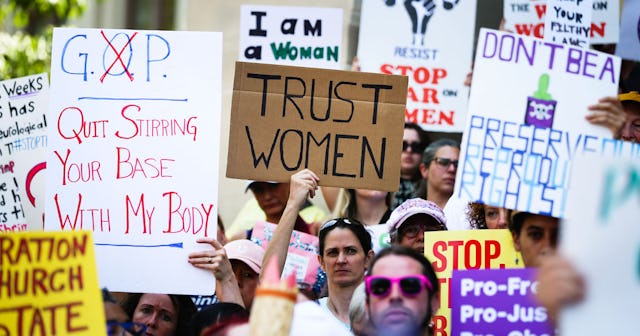Supreme Court Upholds Indiana Law That Forces Burial Or Cremation Of Aborted Tissue

The Supreme Court’s decision on fetal remains disposal is the latest in a string of losses for women’s reproductive rights
After suffering blows to abortion rights in states across the country, including Alabama and Missouri, women woke up to the news this morning that the U.S. Supreme Court agreed to uphold an abortion law in Indiana that requires abortion clinics to dispose of fetal tissue via burial or cremation, suggesting that aborted tissue has personhood.
The anti-abortion bill was signed into law in Indiana in 2016 by then-Governor, now-Vice President Mike Pence, which isn’t super surprising. Also by requiring proper burial for clumps of cells, the law also restricts the use of fetal tissue for medical science and research.
The court’s voice was split 7-2. Justices Ruth Bader Ginsburg and Sonia Sotomayor dissented (hmmm… what do those two justices have in common? Yep, that’s right: female reproductive organs).
While this seems like an enormous loss, especially in the wake of recent state-level decisions about abortion, it’s not all bad news. The decision, which was unsigned, did not take up the other half of Indiana’s new abortion restrictions, which outlaws abortions based on the fetus’s gender, race or disability. Instead, that part of the law will be handled by a lower court at this time.
Another slight upside? The decision said that the law doesn’t impose an “undue burden” on a woman’s right to have an abortion — and we can see why that is the case, even if it does put a burden on abortion clinics, suggests fetuses are human beings with rights, and shames women into thinking they murdered someone.
More kind of better news? The ruling doesn’t suggest that other abortion laws will tilt conservatively in the future. In fact, CATO Institute Director Ilya Shapiro told CBSN that there’s “no indication or guarantee there’s an appetite for this court, however conservative someone might think it is, to take up the abortion issue let alone overturn Roe v. Wade.”
On the other hand, Justice Clarence Thomas (one of two justices who have been publicly accused of sexual misconduct, we’d like to add), took this decision as an opportunity to rant for 15 pages about his anti-abortion thoughts. The screed was mostly about race and eugenics, which is pretty insulting to women — particularly black women — and which leans heavily on extreme conservative ideas that abortion hurts the black community.
“[I]nsofar as abortion is viewed as a method of ‘family planning,’ black people do indeed ‘tak[e] the brunt of the ‘planning,’” he wrote. “Some believe that the United States is already experiencing the eugenic effects of abortion.”
The court side-stepping abortion based on discrimination is certainly a hot-button issue, though. While modern-day abortions based on race or sex are almost unheard of, abortions based on disability, like Downs Syndrome, are more common. In fact, a significant number of late-term abortions are due to the health of the baby — that the baby will die soon after birth due to its disabilities, or that it will have a painful, low quality of life.
The court deciding that a mother can’t abort based on the medical status of the baby could have a huge affect on families — with the bottom line that the decision to abort will no longer be a private discussion between a woman and her doctor.
Planned Parenthood had no love for the Supreme Court’s decision about fetal tissue burial, saying that it is “stigmatizing and shaming patients when they seek basic health care.”
They also said:
“Abortion is a safe and legal medical procedure and should be treated no differently than any other. Planned Parenthood will continue to do everything we can to ensure every person can continue accessing safe, legal abortion — no matter what.”
According to NPR, the court’s decision not to rule on most of the law represents the panel delaying a bigger-picture talk about abortion on the national level, though that is surely coming, and soon.
As for the other abortion laws making their way up the courts, such as the law that bans abortions after the detection of a fetal “heartbeat”? Legal experts say those laws will likely be struck down in lower courts before even making their way to Washington, DC.